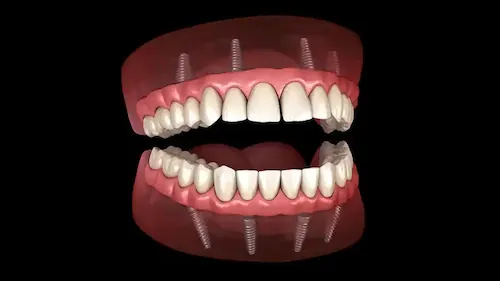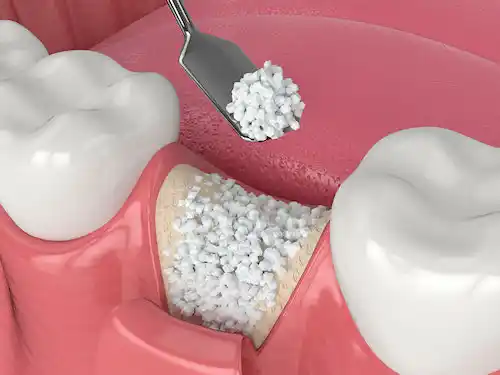Maintaining good dental health is crucial for overall well-being, and tooth loss is a common dental problem that can significantly impact a person’s quality of life. Dental implants have gained popularity as an effective solution for tooth replacement, providing a natural-looking and long-lasting alternative to traditional options like dentures and bridges.
However, the success of dental implants depends on the health and quality of the jawbone. In this article, we will explore the relationship between dental implants and bone health, shedding light on the important factors that contribute to successful implantation and long-term oral health.
Understanding Dental Implants
Dental implants are prosthetic tooth roots that are surgically placed into the jawbone to support artificial teeth. They consist of three main components: the implant (a titanium post), the abutment (a connector), and the dental crown (the visible tooth replacement).
Dental implants mimic the function and appearance of natural teeth, providing stability, durability, and aesthetic appeal. The titanium material used in implants is biocompatible, meaning it integrates with the surrounding bone through a process called osseointegration.

This biological process involves the bone cells attaching to the implant’s surface, forming a secure bond that allows the implant to withstand the forces of chewing and biting.
The Role of Bone Health
Healthy jawbone is crucial for the success of dental implants. During osseointegration, the implant fuses with the surrounding bone, providing a stable foundation for the artificial tooth. Adequate bone density and quality are necessary to ensure proper integration and long-term stability of the implant.
The jawbone needs to be able to support the forces exerted during chewing and biting. Therefore, individuals with compromised bone health may require additional procedures, such as bone grafting, to enhance bone volume and density before implant placement.

Conditions like periodontal disease, tooth extractions, or long periods of tooth loss can lead to a reduction in bone mass, making it necessary to restore bone health before implantation.
Assessing Bone Density and Quality
Before undergoing dental implant treatment, a comprehensive dental examination is necessary to evaluate bone density and quality. Dentists use diagnostic tools, such as X-rays, CT scans, and cone beam computed tomography (CBCT), to assess the condition of the jawbone.
These imaging techniques provide detailed information about bone volume, density, and any potential abnormalities. By thoroughly examining the bone, the dentist can determine the suitability of a patient for dental implant treatment and plan the procedure accordingly.
This assessment is crucial for understanding the available bone and identifying any potential limitations or the need for additional procedures, such as bone grafting or augmentation, to ensure successful implantation.
Bone Grafting and Augmentation
In cases where the jawbone lacks sufficient volume or density, bone grafting or augmentation procedures may be necessary before dental implant placement. Bone grafting involves transplanting bone from one area of the body, using synthetic or donated bone material, or employing growth factors to stimulate new bone growth.
This procedure helps augment the jawbone and create a stable environment for successful implantation. Different types of bone grafts, such as autografts, allografts, xenografts, and alloplastic grafts, are available depending on the patient’s needs and preferences.
Bone grafting can enhance bone volume, fill in defects, and improve bone density, providing a solid foundation for dental implants.
Dental Implants and Preservation of Bone Mass
Tooth loss can lead to bone resorption, a process where the jawbone gradually loses volume and density. When a tooth is missing, the surrounding bone no longer receives the stimulation it needs, causing it to deteriorate over time.
This bone loss not only affects the jawbone’s structure but can also lead to changes in facial appearance, such as sunken cheeks or sagging lips. Dental implants play a crucial role in preserving bone mass.
By mimicking natural tooth roots and transmitting the forces of chewing to the jawbone, implants provide the necessary stimulation to prevent bone loss. The implant’s integration with the jawbone stimulates the bone cells, promoting new bone growth and maintaining the integrity and structure of the jawbone. Dental implants effectively halt the progression of bone resorption and help preserve the facial aesthetics associated with a healthy jawbone.
Maintenance and Long-Term Effects
Proper maintenance is essential to ensure the long-term success of dental implants and maintain optimal bone health. Patients should adhere to good oral hygiene practices, including regular brushing, flossing, and professional dental cleanings.
It is important to attend follow-up appointments with the dentist to monitor the condition of the implant, surrounding tissues, and bone health. Dentists may recommend periodic X-rays or CBCT scans to assess the stability and integration of the implant and ensure that there are no signs of bone loss or complications.
While dental implants have a high success rate, complications such as infection, implant failure, or bone loss may occur in some cases. However, with proper care and regular dental check-ups, the longevity and stability of dental implants can be maximized, providing patients with functional and aesthetically pleasing results for many years.
Conclusion
Dental implants provide an effective and long-lasting solution for tooth replacement, revolutionizing restorative dentistry. Understanding the relationship between dental implants and bone health is crucial for successful implantation and maintenance of oral health. Healthy jawbone, achieved through adequate bone density and quality, is essential for the stability and longevity of dental implants.
Through proper assessment, including bone density evaluations and potential bone grafting procedures, dentists can ensure optimal conditions for implant placement. By preserving bone mass and supporting the surrounding jawbone, dental implants contribute to both functional restoration and maintaining facial aesthetics.
If you’re considering dental implants, consult with one of our dental professionals at Dental & Implant Centers Of Colorado for a comprehensive evaluation and personalized treatment plan to ensure the best possible outcome for your oral health. With proper care, dental implants can provide a lifetime of confident smiles and improved quality of life.






